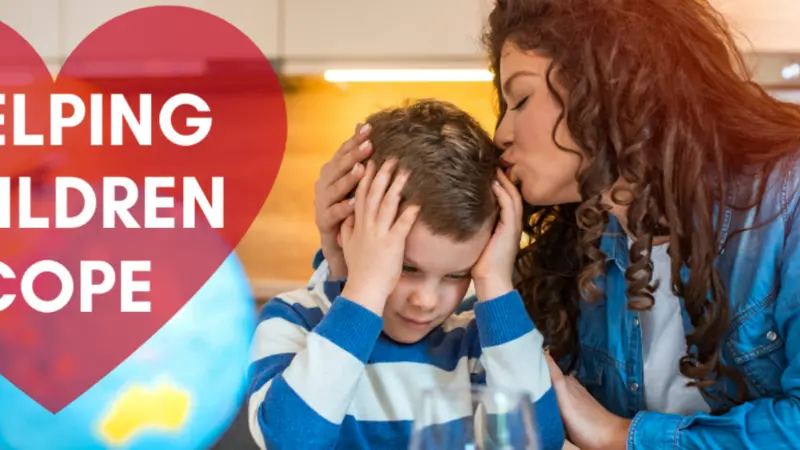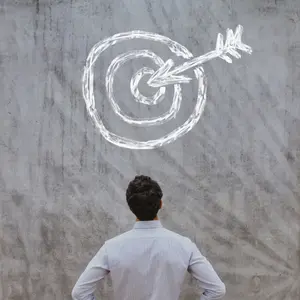

WELLthier Living and Aging

WELLthier Living and Aging
Helping Children Cope During COVID-19
Practical tips from mental health professionals for helping children build resilience and manage stress in the time of COVID-19.
The COVID-19 pandemic has had far-reaching effects, with lockdowns causing unprecedented stress, not only for adults but for children. Although most children are not, at this time, considered to be at high risk of becoming seriously ill with the virus, the pandemic could have a significant long-term impact on their mental health.
Dr. Scott D. Berns, President and CEO of the National Institute for Children’s Health Quality (NICHQ), says we need to look beyond how COVID-19 will impact children’s physical health: “Health care resources are stretched thin, schools are closed, and families are feeling significant stress in response to an ever-changing crisis—all of this will impact children’s health and well-being, now and in the future.”
With schools closed nationwide, children have lost the structure and social connections found there. Many are trying to learn at home, often in households where the routines they once relied on have disappeared. Adjusting to this change is a challenge for many children, especially those with learning disabilities who usually have a team of support specialists at school. Some children may lack access to technologies being used for remote learning.
They’re being exposed to news stories and adult conversations that are heavily dominated by the crisis.
With many parents now working at home or outside the house as essential workers, or coping with unemployment, children have the added burden of worry about their family’s health or financial challenges, including food and housing insecurity. In addition, they’re being exposed to news stories and adult conversations that are heavily dominated by the crisis.
Studies show that children as young as two are attuned to the emotional states of the adults around them. Dr. Florence Huang, a Hong Kong-based psychologist, says that children—younger ones, in particular—see their parents as role models and tend to imitate their behavior. She told the South China Morning Post, “Toddlers and small children may react by showing anger or distress themselves, while older schoolkids may withdraw emotionally or be less likely to react when confronted with negative emotions.” As parents struggle with the anxieties of the pandemic, so too do their children.
However, research shows that children have a remarkable reserve of resilience that enables them to navigate stressful situations and bounce back from stress and challenges. Carolyn Kousky, executive director of the University of Pennsylvania–affiliated Wharton Risk Management and Decision Processes Center, studied children who have faced significant traumas, such as natural disasters. Her research, published by Princeton University, shows that when children learn self-control and problem-solving skills and have close relationships, they can adapt and even thrive through the most extreme adversity.
To foster resilience, the most important thing parents can give their children is their time and attention. The primary determinant in a child’s ability to cope during trauma is having a sensitive and responsive caregiver. Responsive relationships, which provide a buffer for adults in times of stress, are also critically important for children.
Dr. Anne Gearity, PhD, a clinical social worker specialist who practices in Minneapolis, recently shared in a webinar for the Minnesota Association for Children's Mental Health that the first thing parents should think about during this time is practicing kindness. Make sure your children understand that you are on their side.
To foster resilience, the most important thing parents can give their children is their time and attention.
Dr. Gearity reminds parents that everyone is trying to manage during this pandemic, but kids have fewer coping skills. Parents are allowed to get mad at children, “but we can’t stay mad,” says Dr. Gearity. When things are going badly, she says, it’s okay to say, “It’s because of COVID.” Placing the blame for your stress on COVID-19 helps kids understand that a lot of our reactions are due to this unprecedented situation. “Kindness given causes kindness to be received. . . . Imagine what is happening for your children and be there when your child is distressed. This is no time for grudges.”
Effectively communicating with children has major benefits for them and the family’s long-term psychological well-being. Children need honest information about what is happening, but it is important to take into account the child’s age and developmental stage when choosing how and what to communicate about the pandemic. Try to avoid focusing solely on the facts and details of COVID-19, and instead share your feelings with your children, taking care not to overwhelm them with your fears. Being honest not only helps them understand why they’re feeling the way they are but gives them permission to talk about their feelings.
When communicating with your child, it’s important to remember to talk with him not at him. Adults sometimes have a tendency to tell their child what they should think. Dr. Gearity says children often tune out when lectured to. She recommends trying phrases such as “What’s happening for you now?” or “Maybe you’re worrying about . . .” Help your child understand that verbalizing their feelings will help them feel more in control. For older children who are sad about missing rites of passage such as graduations, parents should acknowledge that in the scope of the child’s short life, these are major losses for them. It is important for them to process the experience and talk about the loss they may be feeling. Empathy and acknowledgment will go a long way toward helping a child recover from their losses.
Experts say parents can help children build resilience in the face of adversity by encouraging them to build problem-solving skills. When kids learn how to try different things on their own to solve a problem, without parents stepping in to do it for them, they develop these skills. Parents can facilitate this process by asking questions that allow children to think through a problem and come up with their own solution. They may suggest creating a list of pros and cons and talking through them. Parents can also encourage children to try things that are outside their comfort zone. When kids embrace healthy risk-taking, they learn to push themselves through difficult moments. Dr. Gearity suggests that this time at home is a good opportunity to give your child the chance to help create his own schedule. Allow her to be her own executive, she says, having a say in how and when she is going to accomplish her schoolwork or chores.
Share your feelings with your children, taking care not to overwhelm them with your fears.
Embracing mistakes is an important element of learning resilience. Kids who avoid failure are often more anxious and less likely to take healthy risks. Parents can talk about their own mistakes and share how they recovered from them; helping children understand that mistakes are necessary for growth promotes a positive mindset. In Dr. Gearity’s words, “Learning makes you feel better . . . learning is mastery.” She suggests reminding children that if they didn’t succeed today, they can “try it again tomorrow.”
Parents should also make opportunities to model optimism for children. If your child is focused on the negative aspects of a situation, try to look for the bright side and teach her how to reframe thoughts to find the positive. Stories of hope can offer children a positive counterbalance to the messages of fear and negativity that are so prevalent now. Dr. Gearity emphasizes celebrating every tiny effort, even the smallest incremental change, because managing hard times requires a lot of positive emotion.
Dr. Gearity notes that families are out of practice being a family unit. Spending so much time together is a new experience for most families, who are accustomed to schedules packed with activities. Parents should take this time to restore or create family rituals such as family meals, game nights, or movie nights. Dr. David Anderson, a clinical psychologist at the Child Mind Institute in New York City, suggests that parents think back to their own childhoods, before electronics dominated entertainment, and make a list of their favorite family activities. He says, “They often then generate lists of arts and crafts activities, science projects, imaginary games, musical activities, board games, household projects, etc.” Now is the time to allow children to have a voice and to feel they are a part of creating a positive structure for the family. Try to foster a sense of “we’re in this together,” Dr. Gearity says, noting that this is not the time for authoritarian parenting.
Stories of hope can offer children a positive counterbalance to the messages of fear and negativity.
Parents can take this time to acknowledge the difficulty of the situation and demonstrate healthy coping skills. Dr. Lisa Damour, PhD, adolescent psychologist and author, told UNICEF that anxiety and stress are normal human functions that alert us to threats, and parents should help children understand, “You’re having the right reaction. Some anxiety right now makes sense, you’re supposed to feel that way. And that anxiety is going to help you make the decisions that you need to be making right now.” Dr. Damour says it is helpful to divide the problem into two categories: things I can do something about, and things I can do nothing about. Although a lot may fall into the second category right now, engaging in positive distractions, such as doing schoolwork, reading a book, or watching a movie, can be a very appropriate coping skill. Parents can also use the 3Rs to help: reassurance, routines, and regulation. Reassure children about their safety, maintain predictable routines, and support children’s regulation skills by helping them manage difficult feelings.
A growing body of evidence supports the effectiveness of mind-body strategies to help children develop healthy coping skills:
- Teach children deep-breathing exercises, which are an effective way to reduce stress and create calm. There are many apps available to teach children to release muscle tension or control breathing rate.
- Practice mindfulness with children a few minutes a day. Simply paying attention to what is happening in the moment can settle the mind, build resilience, and improve symptoms of anxiety and depression.
- Get regular exercise and time spent in nature, which have been shown to improve mood and energy levels. Research has shown that yoga may be especially effective in improving psychological function in children.
- Eat healthy, whole foods. Research suggests a diet of too much junk food, particularly refined carbohydrates and sugars, can negatively affect attention and mood.
It is important for parents to practice self-care in order to provide emotional support for their children. Dr. Jack Shonkoff, the director of the Center on the Developing Child at Harvard University, says, “In this particular crisis we are in right now, meeting the needs for the adults who care for the children is the only way to meet the needs of the children. You cannot bypass the needs of the adults.” Whenever possible, prioritize time and energy for activities that are enjoyable and meaningful to parents. Even short periods of time spent on self-care can benefit the whole family.
Parents should be mindful of how they are handling their own anxieties right now and remember that how they manage anxiety has an impact on children. Mark Reinecke, PhD, a clinical psychologist with the Child Mind Institute, says, “Keep a sense of perspective, engage in solution-focused thinking and balance this with mindful acceptance.” If you do feel overwhelmed, try to step away and take a break. And be aware of the type of conversations you have within earshot of your child.
It is important for parents to practice self-care in order to provide emotional support for their children.
Ensure that all family members maintain positive social connections during the time of social distancing. Socializing helps us regulate mood and helps adults and children alike stay grounded. Dr. Shonkoff stresses, “If we separate physically and don’t find a way to stay connected, then we are creating an environment that is undermining the healthy development in young children.” Social connectedness is an important protective factor for children and adults; physical distancing should not turn into social isolation. During this time, use technology to connect to extended family and other families with children to offer support and share the experience of physical distancing.
Mental health experts emphasize that we all should recognize that this time of COVID-19 is hard, but we can and will help each other survive and even thrive. Dr. Anderson says, “We should forgive ourselves the image of perfection that we normally aspire to as parents.” Ultimately, the best advice, the experts agree, is to be kind to yourself and find a balance that works for your family.
REFERENCES
Sources:
Bartlett, J. D., & Vivrette, R. (2020, April 3). Ways to promote children’s resilience to the COVID-19 pandemic. Child Trends. https://www.childtrends.org/publications/ways-to-promote-childrens-resilience-to-the-covid-19-pande…
Bertin, M. (2020, April 23). Resilience and routines for families during the pandemic. Mindful Schools. https://www.mindfulschools.org/implementation-stories/resilience-and-routines-for-families-during-t…
Campbell, P., Herrman, H., Hickie, I., & Reve, B. (2020, May 1). How to support your child's mental health during COVID-19 and beyond. World Economic Forum. https://www.weforum.org/agenda/2020/05/advice-for-parents-mental-health-children-covid-19/
Culbert, T. (2015, January). Integrative mental health strategies for kids. Minnesota Physician, 28(10). https://www.prairie-care.com/files/8514/4173/2418/MN_Physician_TimothyCulbert_CMYK.pdf
Dalton, L., Rapa, E., & Stein, A. (2020, May 1). Protecting the psychological health of children through effective communication about COVID-19. The Lancet, 4(5), 346–347. https://www.thelancet.com/journals/lanchi/article/PIIS2352-4642(20)30097-3/fulltext
Gearity, A. (2020, April 17). Helping your children manage COVID-19 realities: Beyond the facts and into the effects on our lives [Webinar]. Minnesota Association for Children's Mental Health. https://macmh.org/publications/covid-19-resources/#1
Gonzales, S. (2019, May 29). How children pick up on parents’ anxiety and anger and why we should be mindful of how we act. South China Morning Post. https://www.scmp.com/lifestyle/health-wellness/article/3012143/how-children-pick-parents-anxiety-an…
UNICEF. (2020, March 26). How to protect your family’s mental health in the face of coronavirus disease (COVID-19): A conversation with adolescent psychology expert Dr. Lisa Damour. https://www.unicef.org/coronavirus/how-protect-your-familys-mental-health-face-coronavirus-disease-…
Center on the Developing Child at Harvard University. (2020). How to support children (and yourself) during the COVID-19 outbreak. https://developingchild.harvard.edu/resources/how-to-support-children-and-yourself-during-the-covid…
Hurley, K. (2020, April 16). How parents can protect kids’ mental health during the pandemic. The Washington Post. https://www.washingtonpost.com/lifestyle/2020/04/16/how-parents-can-protect-kids-mental-health-duri…
Hurley, K. (2018, September 26). Resilience in children: Strategies to strengthen your kids. PsyCom.net. https://www.psycom.net/build-resilience-children
Jacobson, R. (2020). Supporting kids during the coronavirus crisis. Child Mind Institute. https://childmind.org/article/supporting-kids-during-the-covid-19-crisis/
Kousky, C. (2016, Spring). Impacts of natural disasters on children. Future of Children, 26(1). https://files.eric.ed.gov/fulltext/EJ1101425.pdf
American Academy of Pediatrics. (2016, September 1). Mind-body therapies in children and youth. https://pediatrics.aappublications.org/content/138/3/e20161896
Pfitzer, S. (Host), & Shonkoff, J. (Center Director). (2020, April 21). COVID-19 special edition: A different world [Audio podcast episode]. In The Brain Architects. Center on the Developing Child at Harvard University. https://developingchild.harvard.edu/resources/the-brain-architects-podcast-covid-19-special-edition…
National Institute for Children’s Health Quality. (2020). Supporting children’s health during and after the COVID-19 pandemic. https://www.nichq.org/insight/supporting-childrens-health-during-covid-19-pandemic
Helpful Resources:
SOUNDS TRUE—children’s books that plant the seeds of mindfulness, compassion, kindness, self-care, and other personal growth skills. https://product.soundstrue.com/soundstruekids/
ME MOVES APP—uses research-based rhythmic visual patterns, music, and movement in engaging “whole brain” activities.
THE ADVENTURES OF SUPER STRETCH—a fun, movement-based app to teach kids fun, developmentally appropriate yoga poses.
HEALING BUDDIES COMFORT KIT—an app that uses scripted relaxation techniques to teach kids of all ages mind/body self-regulation skills to manage anxiety, insomnia and other stress-related issues.


 By
By







